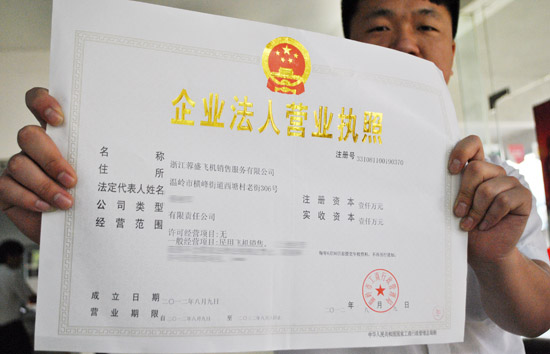
The first privately owned aircraft sales company in Zhejiang province has been registered in Wenling, with capital of 10 million yuan ($1.57 million), to meet the growing demand for private aircraft.
"Dozens of potential customers have already expressed their interest in the purchase of private aircraft," said Cai Gangjun, owner of Zhejiang Rongsheng Private Jet Sales and Service Co Ltd.
Cai, who also owns a 4S car shop, plans to open the 10,000-square-meter facility, early next year.
 |
|
Cai Gangjun, owner of Zhejiang Rongsheng Private Jet Sales and Service Co Ltd, shows his business license on Aug 16, 2012, in Wenling, Zhejiang province. The company, which will offer a range of aftersales services, is the first privately owned aircraft sales operation in the province. [Photo / China Daily] |
"Two helicopters and one fixed-wing aircraft will be placed in the showroom for customers to have a close look," said Cai.
Cai added that unlike foreign companies, which only sell aircraft, he will also offer aftersales services including assistance with obtaining airworthiness certificates, arranging aircraft bays, hiring pilots and a long-term maintenance service.
Private helicopters, small private fixed-wing aircraft and corporate aircraft from the United States and the Europe at prices ranging from 1 million yuan to 5 million yuan will be imported by Cai to meet demand from customers mainly in eastern China.
Cai was quite optimistic about market demand, as more than 10 customers have expressed their intention to buy aircraft even before the shop has opened.
"Some of the potential customers are my friends and others are former customers from my car store," said Cai.
The registration of Cai's store was approved by the local authorities on Aug 13.
"The application to register a company selling aircraft is the same as any other company, but more examination and approval procedures are required if the company also supplies maintenance and insurance services for airplanes," said Li Yayuan, deputy director of the company registration department of Wenling Administration for Industry and Commerce.
However, some private helicopter owners have expressed concern over the tight restrictions they still face if they want to take part in low altitude flying.
"I've waited for nearly five years for the opening of low altitude flying," said Guan Hongsheng, the organizer of Wenzhou Lucheng Hailukong Club, which was launched in 2008 and is dedicated to motorcycle racing, boating and helicopter flying.
Guan owns a powerful BMW motorcycle, three helicopters worth more than 5 million yuan, and three yachts.
His daring exploits made headline news in Zhejiang in 2011 when he and a friend, who was a member of his club, were caught flying separately in two Rotorway Exec 162F helicopters for 20 minutes without official approval.
They were each fined 20,000 yuan over the incident.
As a helicopter user, Guan suggested that there is a need to simplify the application process, which he said still takes too much time and work.
"Although the application process has been simplified compared to the past, the private helicopter market will not realize its full potential if low altitude flying is still restricted," said Guan.
To be cleared to fly, aircraft must be registered with the local Civil Aviation Administration of China office, which checks that the model is approved for Chinese airspace.
Pilots also have to submit flight plans for every proposed journey, including flying time and the route to be taken in advance.
In late 2010, a circular jointly issued by the State Council and the Central Military Commission said the country's low altitude airspace will be partly opened to private flights to promote the country's aviation sector.
By 2011, there were 132 private jets in the country, less than 1 percent of the total number of jets in the United States.
At the end of 2011, the authorities promised to gradually open the previously tightly controlled low altitude airspace below 1,000 meters by simplifying the application process.
"I believe that the private aircraft market will become quite competitive if the regulations are loosened, and I am brave enough to give a try," said Cai, who said he planned to open another store in Chengdu, Sichuan province, next year.
Jin Yunguo contributed to this story.
Contact the writer at yuran@chinadaily.com.cn